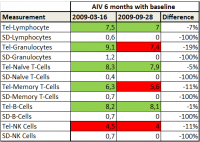No, he says 39 families were identified, so far more compounds have some effect and 100 would be 60% vs Hela? That's high.Bill Andrews announced that Sierra Sciences has discovered 39 telomerase activators that at up to 100 times more potent than TA65 and Product B. Trials to begin in 3 years.
Is the PK for those new substances linear or does it take less substance to get to about 1% activation compared to Hela (like Cyclo)? I am not sure what 100 times more potent really is supposed to mean.
It's exciting to see the progress Sierra seems to make, but I'd caution everyone based on the knowledge that about 1 in hundred lead substances become meaningful in pharmacology.
Once again, how many of these in-vitro compounds are absorbed well in the GI tract, have a good half-life time (e.g. Resveratrol has only minutes), don't degradate to early or react with proteins or glycans (think PQQ, a SIRT3 activator but very reactive), are cheap to extract (still an issue with Cyclo) and most important, come without adverse side effects (just think of Estrogen related substances).
































 This topic is locked
This topic is locked

















